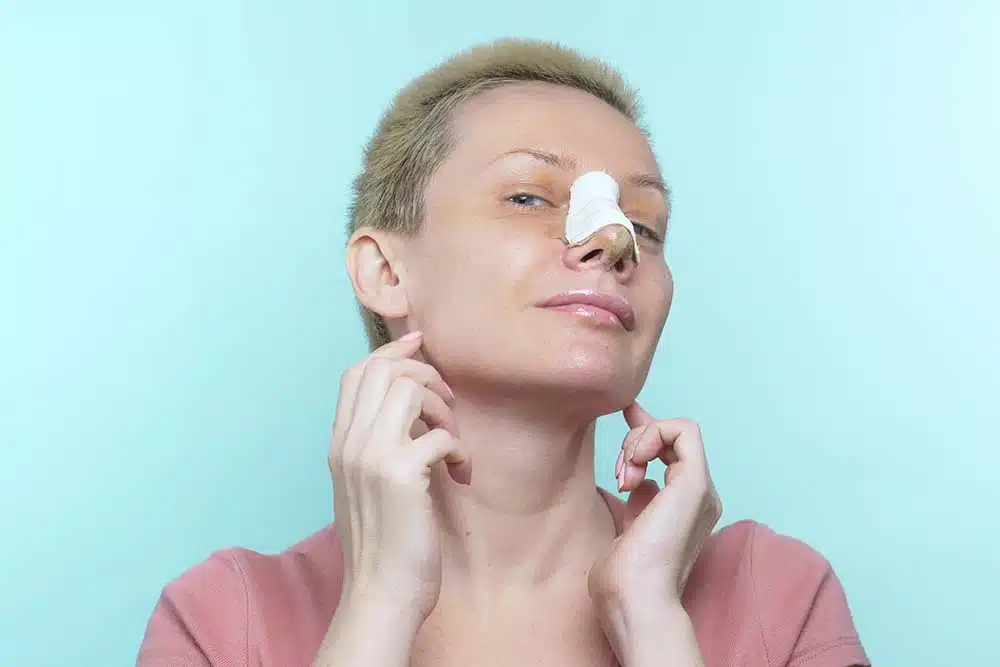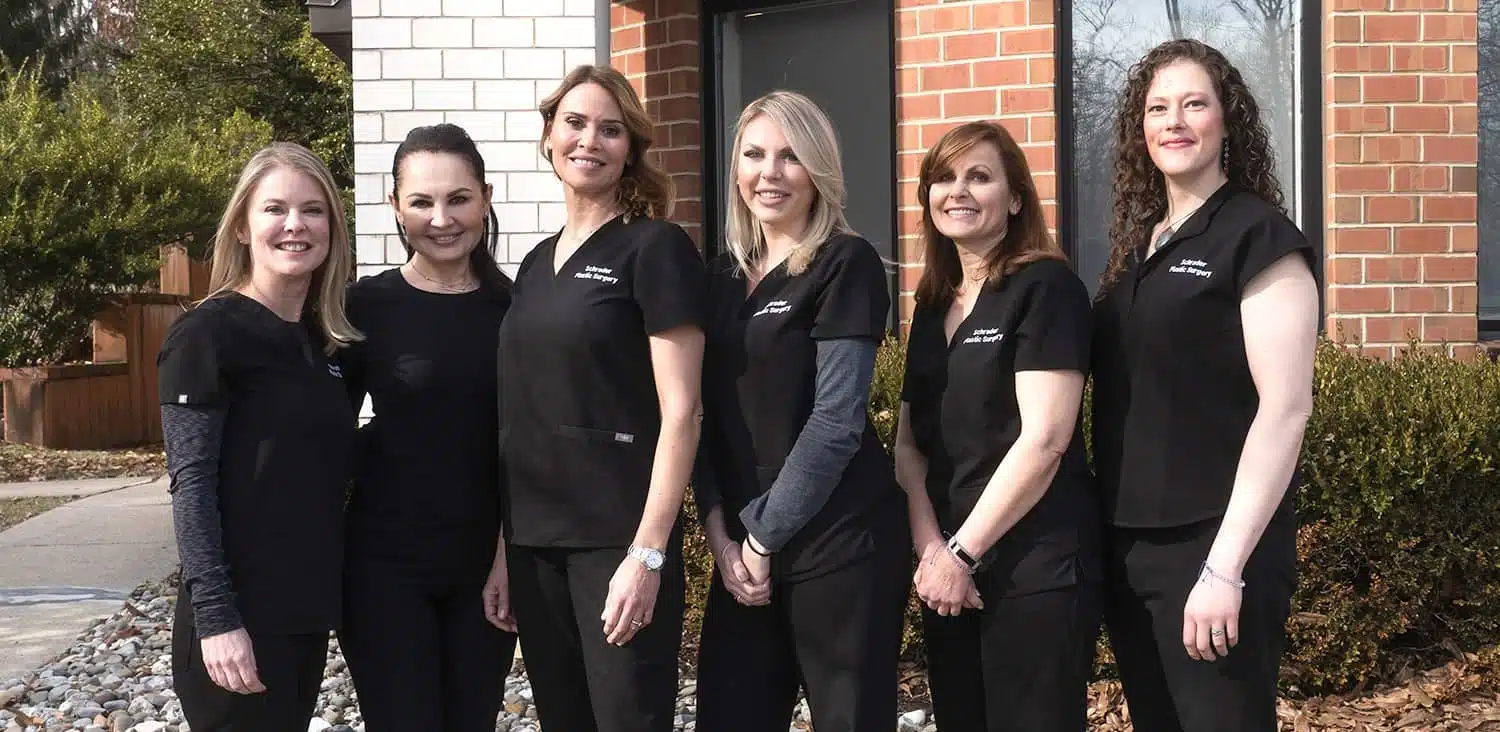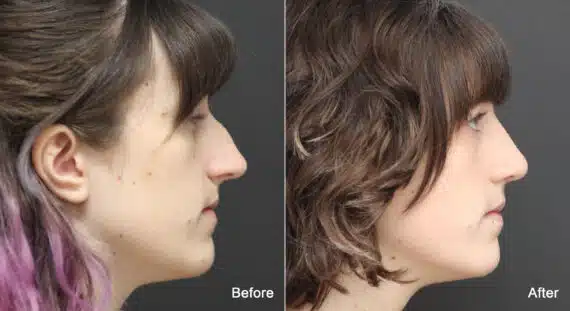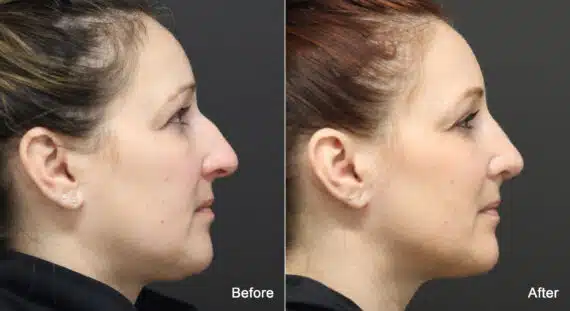Even though swelling is a normal part of the rhinoplasty recovery process, it’s natural for patients to feel concerned about it after surgery. However, most of the time, swelling shouldn’t be a cause for alarm. It’s a temporary and expected part of your nose’s healing journey as your body recovers from the procedure.
That said, there are steps you can take to minimize swelling and speed up recovery. And although complications are rare, excessive or persistent swelling can sometimes indicate an issue that needs immediate attention. Read on to learn the general rhinoplasty swelling stages, how to manage swelling, and when it might require expert intervention .

How Long Does Swelling Last After Rhinoplasty?
Most of the noticeable swelling after rhinoplasty subsides within 2 to 3 weeks. By then, the majority of the puffiness should fade, revealing a more defined nose. However, it’s important to remember that full recovery can take up to a year as subtle swelling continues to dissipate. For patients undergoing revision rhinoplasty or those with thicker skin, noticeable swelling may persist slightly longer but should become presentable after the first month.
Tip Swelling After Rhinoplasty Timeline
The healing process after rhinoplasty can be divided into several stages, with swelling typically decreasing over time. Here is a general rhinoplasty recovery timeline with a focus on the swelling stages:
Day 1: Initial Post-Operative Phase
Day one is all about rest and comfort. You’ll see swelling and some bruising around the nose and eyes, and nasal congestion will make breathing through the nose feel blocked—that’s expected at this point in your rhinoplasty journey. Keep your head elevated, use the prescribed pain medication as directed, and apply cold compresses to the cheeks (not directly on the nose). This first day of the recovery period is mostly about taking it easy and letting your body start the healing process.
All about rest and comfort
Days 2–3: Acute Swelling Stage
These are the peak days for initial swelling—it’s normal for the nose and the area under the eyes to look the puffiest now. Your nasal passages will feel especially blocked, so breathing through the nose may be tough. Keep resting, stay hydrated, and use cold compresses on the cheeks (not directly on the nose) to help with discomfort. Elevating your head when you sleep will also make these couple of days a bit easier.
Peak days for initial swelling
Days 4–7 (First Week): Splint Removal
By the end of week one, you’ll start to see the swelling back off a bit. Sometime around days 5–7, I’ll remove your nasal splint and any tapes—most patients notice less bruising and a little less puffiness after that. As discomfort eases, you can ease back into light activity: short walks and gentle daily tasks are fine. Still avoid anything strenuous, bending, or lifting; think “easy does it” while your nose continues to settle.
Swelling backs off a bit
Weeks 2–4: Most Swelling Subsides
As we move into the second week, the bruising is mostly fading and the swelling is easing up, so many patients feel ready to head back to work or regular routines. You’ll notice steady improvements week by week—the nose begins to look more defined, especially as we approach the three-week mark. By weeks 3–4, the tip and bridge start to refine, though they may still feel a bit firm or “puffy” at the end of the day. By the end of the first month, roughly 70–80% of the swelling is gone, and you’ll have a clearer preview of your final result (with more subtle changes still to come).
Swelling is easing up
Months 1–2: Gradual Return to Normalcy
At this point, most of the visible swelling has settled down, and you can ease back into your usual routine. Light workouts are typically fine again—think brisk walking, gentle cycling, or yoga without inversions. You’ll start seeing the nose take on its intended shape, though a little residual puffiness (especially at the tip) is normal and usually only noticeable to you. Some stiffness or numbness can linger, particularly at the tip; that’s part of the healing process and continues to improve over time. Keep listening to your body and we’ll guide you on stepping things up as you feel ready.
Visible swelling has settled down
Months 3–5: Residual Rhinoplasty Swelling
From months three to five, healing shifts into a slower, more subtle phase. You may still see a bit of fullness, most noticeably at the tip and along the bridge, but it keeps settling little by little. Each week the nose should feel more “yours” again, with gentle refinements in shape and definition. Most swelling has faded by now; what lingers is usually a mild puffiness, and it tends to hang on a bit longer in thicker skin. Keep being patient—this is all part of the normal maturation of your result.
Most swelling has faded by now
Months 6–12: Your Nose Job’s Final Results
This is the home stretch. Between six months and a year, almost all swelling has resolved and the nose settles into its long-term shape. You might notice a trace of fullness at the tip here and there, but it’s usually subtle. Most patients say the nose feels soft, natural, and “part of them” again at this stage. We’ll still check in, but you can expect your result to look stable and camera-ready.
Almost all swelling has resolved
After 1 Year: Residual Swelling Subsides
By the year after surgery, you’re looking at the finished product. Any lingering puffiness—usually just at the tip—keeps fading, especially if you have thicker skin. Between 12 and 18 months, those last, subtle changes settle in and the nose looks fully refined and stable. At this point, what you’re seeing in the mirror is your long-term result.
Looking at the finished product


Trust your face to a specialist
My Goal is to create Harmony, Balance & true Beauty
How to Reduce Swelling After Rhinoplasty Surgery
Swelling after rhinoplasty is an inevitable part of the healing process, but there are effective ways to manage and reduce it. By following these rhinoplasty recovery tips, you can promote a smoother recovery and help your nose look its best sooner:
Elevate Your Head
For the first several days, sleep propped up on two to three pillows or in a recliner. Keeping your head above your heart improves venous and lymphatic drainage, which limits fluid buildup and swelling. Avoid lying flat or bending over; that pressure shift can make the nose throb and puff up.
Use Cold Compresses
During the first 72 hours, apply cold packs to the cheeks (not directly on the nose) for 10–20 minutes, then take a break. Always use a thin towel barrier—never ice on bare skin. Gentle, not heavy pressure. If it feels painfully cold or increases discomfort, stop and let the area warm up.
Avoid Strenuous Activities
Give your nose a quiet couple of weeks. Skip running, weightlifting, hot yoga, and anything that spikes your heart rate for 2–3 weeks—higher blood pressure means more swelling and throbbing. No swimming for at least a week. Also avoid bending, straining, or heavy lifting; light walks are fine to keep circulation moving.
Limit Sodium Intake
Salt pulls water into tissues, so cutting back helps swelling settle faster. Aim for low-sodium choices, avoid processed or takeout foods, and read labels (goal: <1,500–2,000 mg/day unless directed otherwise). Flavor with herbs/citrus instead of salt. Stay well hydrated; potassium-rich foods (banana, avocado) can also help balance fluids.
Stay Hydrated
Water keeps lymph moving, thins mucus, and helps your tissues clear swelling byproducts. Aim for a steady sip schedule—about 6–8 glasses (1.5–2 L) daily unless your doctor says otherwise. Limit alcohol and excess caffeine early on; they dehydrate. Herbal tea, diluted electrolyte drinks, and brothy soups count toward your total.
Avoid Sun Exposure
UV and heat dilate surface vessels and can worsen swelling (and darken bruises/scars). For the first few weeks, stick to shade, wear a wide-brim hat, and avoid midday sun. If you must be outside, use broad-spectrum SPF 30–50 with zinc oxide/titanium dioxide, reapply every 2 hours, and don’t put sunscreen on fresh incisions.
Don’t Blow Your Nose
For the first week (often longer if I advise), skip nose blowing—it forces pressure through healing tissues and can trigger bleeding or extra swelling. If you’re congested, gently dab or use saline sprays and a humidifier. Sneeze with your mouth open. If mucus crusts form, soften with saline, don’t pick.
Follow Your Surgeon’s Aftercare Instructions
Your roadmap to a successful recovery is sticking to the plan we gave you. After nose surgery, small steps—meds, cleaning, activity limits—matter at each healing stage. I tailor these guidelines for rhinoplasty patients like you. Please follow them closely; they’re designed to protect your result from this cosmetic procedure and prevent avoidable setbacks.
How Painful is the Rhinoplasty Recovery Process?
Pain after rhinoplasty is usually manageable rather than severe. In the early recovery phase (first 2–3 days), expect pressure, congestion, and a tender, throbbing feeling—most patients describe it as uncomfortable more than truly painful. Prescription pain meds, elevation, and cold compresses keep symptoms under control.
By the end of week one, discomfort tapers to a dull ache or soreness, especially at the tip and along the bridge. Primary rhinoplasty generally hurts less than revision surgery because tissues are less scarred. Gentle activity, good hydration, and following aftercare closely all help you turn the corner faster while swelling and stiffness settle.
Rhinoplasty Results: Before & After Photos
* All patients are unique and individual results may vary.
When to Worry About Swelling During Rhinoplasty Recovery Time
In most cases, swelling after rhinoplasty is normal and will resolve on its own. However, there are certain signs that may indicate a problem requiring immediate attention. Be on the lookout for the following:
- Severe Swelling That Worsens Over Time: Prolonged swelling that doesn’t improve after the first few weeks or continues to worsen could be a sign of an underlying issue.
- Asymmetrical Swelling: Swelling that appears uneven or lopsided and persists for more than a week may need evaluation.
- Swelling Accompanied by Pain or Fever: Pain that increases or is paired with fever or discharge could indicate an infection.
- Difficulty Breathing Through Your Nose: Persistent nasal obstruction due to swelling that doesn’t resolve might need medical attention.
If you experience any of these symptoms, contact your surgeon promptly to ensure proper evaluation and treatment. Early intervention can prevent complications and support a smoother recovery.
Choosing The Best Surgeon For Your Rhinoplasty Procedure
Rhinoplasty is one of the most delicate, complicated, and expensive facial plastic surgeries. To achieve the best results and ensure that your investment and recovery are worthwhile, it’s essential to choose a surgeon with specialization, experience, and board certification. These factors help ensure both safety and outstanding results.
If you live in New Jersey and you’re considering rhinoplasty, Dr. Nicole Schrader is a double-board-certified facial plastic surgeon specializing in rhinoplasty and other facial procedures. With years of experience and a commitment to individualized care, Dr. Schrader delivers exceptional results for her patients. Call us at 609-279-0009 or contact our office today to schedule a rhinoplasty consultation and learn how she can help you achieve your goals.


